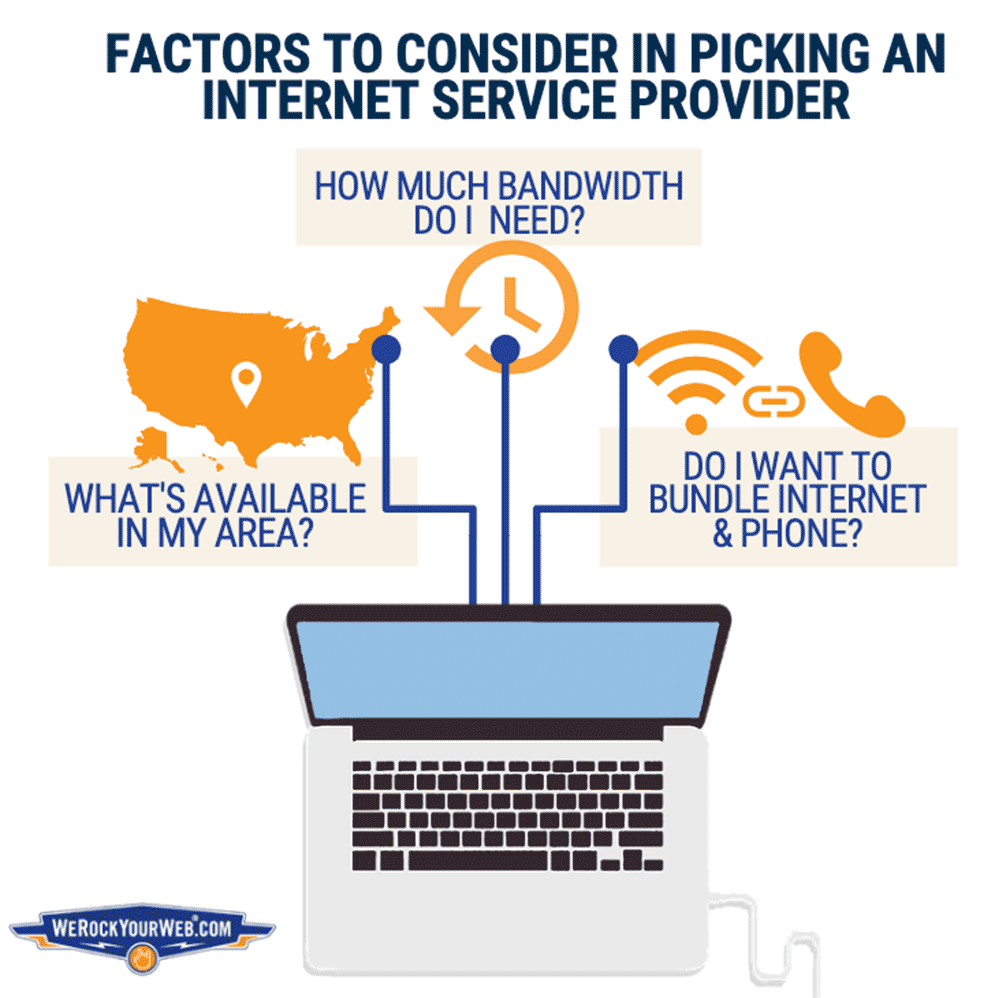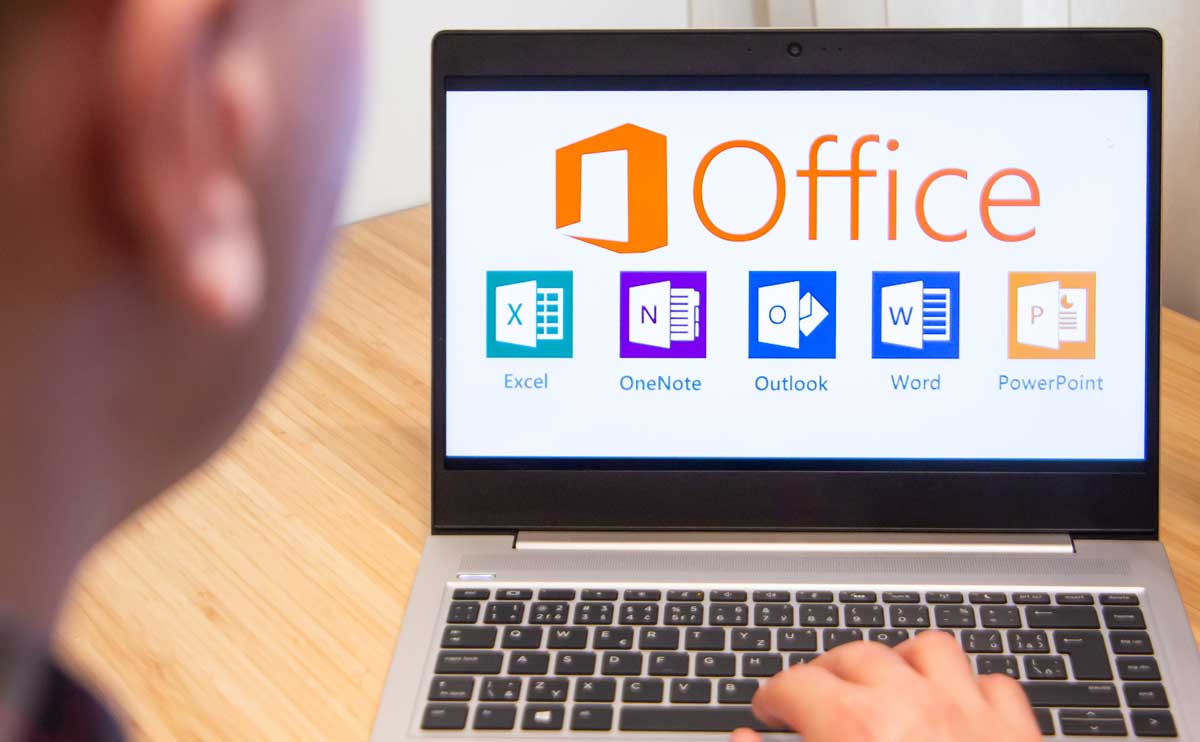When you purchase through links on our site, we may earn a commission. Here’s how it works.
| High Speed |
|
| Reliability |
 |
| No Contracts |
|
| Light Usage |
 |
Searching for the best internet provider for your small business can be as daunting, if not more so, than searching for your office space. What do you need to consider when choosing a provider (assuming you have options in your area)? How much bandwidth do you need? We answer these and many other questions to hopefully make the search for this pivotal service for your business a bit less confusing.
Article Overview
- Factors To Consider (& Infographic)
- Best Business Internet Providers
- Other Providers To Consider
- DSL vs Cable vs Fiber vs Satellite
- Need VOIP Or Added Security?
Factors To Consider
Here are some questions to ask yourself before you decide upon an internet service provider (ISP) for your small business.
What’s Available In My Area?
In this article, we’ve included ISPs with some of the most widespread coverage in the U.S. But depending on where your business is located, you may not have many options. With all of the ISPs we review here, you can go to their websites and enter your zip code to determine availability.
How Much Bandwidth Does My Business Need?
If you only have a few employees and devices, you could operate sufficiently with 50 Mbps (megabits per second) speeds. Ten or more employees using the internet regularly will probably increase your speed needs to 100 Mbps or more.
But the number of users you have is only one factor to consider when choosing the speeds you’ll need. You also have to consider the types of internet activities your business uses. A lower bandwidth is fine if all you need is email and web browsing. But you’ll need to bump up your bandwidth if you have large file downloads, use web conferencing or cloud-based applications.
Do I Want To Bundle Internet & Phone?
All of the ISPs in this article offer bundled packages for business phone and internet service. In many cases, this can save you some big bucks. A bundle lets you streamline all network and calling needs without the hassle of multiple installations. It also allows you to manage your services from one account and have only one company to contact for support.
Best Business Internet Providers
We chose our top picks based on several factors, including coverage/availability, speeds, variety of plans, reliable uptime, pricing, customer support and more.
High Speeds: Verizon FiOS Review
While Verizon offers basic broadband internet service in 40+ states across the country, speeds are limited to 15 Mbps, and many companies will require more juice. If you’re in the Northeast, however, you can enjoy high-speed internet via their fiber optic (branded FiOS) services. FiOS, with fairly equal download and upload speeds, is optimal for companies requiring a lot of video conferencing, transactions and online data backup.
Their FiOS plans start at $69/month for 100 Mbps for a 1-year contract (and you can add one digital voice line for $25/month). But if you go with a 2-year contract, you can save even more and get some perks, like no activation fees, prepaid Visa cards and excellent discounts on internet and voice bundles.
Verizon FiOS serves 10 Northeast states with the greatest coverage in New York, New Jersey and Pennsylvania. They also offer DSL coverage in 11 states along the East coast.
We switched to FiOS for our home office internet service after having Comcast and we’re so glad we did! Comcast had constant outages and spotty connections in our area (not to mention terrible customer service) but we’ve never had any issues with FiOS speed or service in more than two years. The technicians who helped set everything up were very friendly and the process overall was very pleasant. – Sadie, Marketing at We Rock Your Web
Pros |
Cons |
|
|
Reliable Connections: Comcast Business Review
Comcast, the well-known residential cable and internet provider, has several business plans with high, reliable speeds. Their coverage is widespread and pricing is competitive compared to other big players like Verizon and AT&T. Their plans start at $69.95/month for 35 Mbps, but their best deal is $99.95/month for 300 Mbps.
Comcast is available in 39 states with the greatest coverage in the Mid Atlantic, North Pacific, California, Florida and Illinois.
Pros |
Cons |
|
|
No Contracts: Spectrum Business Review
If you don’t want to be locked into a long-term contract, Spectrum Business, a division of Charter Communications, is the only business ISP in our review that offers month-to-month plans with no early cancellation fees.
Spectrum is also a great value — their lowest-priced plan is $59.99 for cable internet speeds of 200 Mbps. And you can save even more if you bundle it with voice (but bundles require long-term contracts). Spectrum Business serves 44 states with the most widespread coverage in Ohio, New York and North Carolina.
Pros |
Cons |
|
|
Low-Usage Plans: Frontier Business Review
Frontier is a great option for small businesses that don’t need a lot of juice, with DSL pricing starting at $34.99 for 12 Mbps. But their DSL speeds max out at a mere 25 Mbps. They also offer fairly affordable plans using some of Verizon’s fiber-optic network, starting at $49.99 for 30 Mbps.
Unfortunately, the company is notorious for poor customer service. Frontier is available in 35+ states with the most widespread coverage in the Great Lakes states, West Virginia, Texas and the West.
Pros |
Cons |
|
|
What About AT&T, CenturyLink, Cox, & Viasat Exede?
Be sure to read our reviews of these other popular business ISP’s that may provide service in your area.
AT&T | CenturyLink | Cox | Viasat Exede
AT&T Review
AT&T offers a wide variety of fiber and DSL internet plans for small businesses, starting at $60/month for 25 Mbps download speed. You can scale your speeds up to 500 Mbps with DSL if you don’t have fiber in your area (and up to 1,000 Mbps with fiber). Their pricing is consistent nationwide, but the cost gets expensive for higher-speed plans compared to other service providers.
All AT&T business internet plans include strong security with anti-spyware, anti-virus and a firewall. They also offer internet and phone bundles for businesses (and DIRECTV packages). AT&T is available in 36 states, with the most widespread coverage in the Southeast and Midsouth (13 states).
Unfortunately we’ve also received a significant number of reports of poor customer service and questionable sales tactics which has kept AT&T from consideration for our top spots this year.
Pros |
Cons |
|
|
CenturyLink Review
One of the country’s largest residential internet providers, CenturyLink offers widespread DSL coverage for small businesses, but speeds max out at 140 Mbps. And pricing is higher than average, starting at $65/month. However, unlike many other ISPs, you can opt for a month-to-month plan.
CenturyLink also offers fiber in a few select areas with speeds up to 940 Mbps, but the pricing is high compared to other companies. They serve 39 states with the most widespread coverage in the West and Pacific Northwest.
Pros |
Cons |
|
|
Cox Business Review
Cox offers cable broadband and limited fiber-optic plans for businesses. Pricing depends on where you live, with plans starting around $100 for 25 Mbps — much higher than average. But you do get some perks.
All plans include a free static IP address, online backup and strong security with anti-spyware, anti-virus and a firewall. Cox only serves 18 states with the most widespread coverage in Arizona, California, Kansas and Virginia.
Pros |
Cons |
|
|
Viasat Exede Review
Viasat Exede is the country’s second-largest satellite internet service provider and a good option for small rural companies that don’t have access to other ISPs. They offer speeds up to 100 Mbps, but these can vary depending on your location. And all plans have data caps (even their “unlimited” plans have soft caps, meaning once you use up your allotted data, you may experience slower speeds).
Their cheapest metered business internet plan is $50/month for 1GB data and 35 Mbps download speeds. And their cheapest “unlimited” plan is $175/month for 35 Mbps with a soft cap of 75GB. If you have access to other ISPs, you can likely find more affordable options elsewhere.
Pros |
Cons |
|
|
Internet Delivery Methods Compared: DSL vs Cable vs Fiber vs Satellite
DSL (Digital Subscriber Line): DSL delivers internet via copper phone lines and has widespread coverage nationwide. It has higher latency and lower bandwidth than cable. DSL is typically the only wired internet option in rural areas.
Cable Broadband: Cable delivers internet via copper coaxial television cables and has widespread coverage nationwide. It’s faster and has lower latency than DS,L but speeds can slow during peak usage times because the bandwidth is shared with neighboring users.
Fiber Optic: Delivers internet via fiber-optic cables. It’s by far the fastest and most reliable delivery method. However, it only has 25% coverage nationwide, largely in major metropolitan locations.
Satellite: The only non-wired internet delivery system, satellite is often the only option for extremely remote, rural areas. It’s typically not as fast or reliable as DSL or cable.
Need VOIP Or Added Security?
If you’re not sure you want to bundle internet and phone, be sure to read our article about the best VOIP services, which includes optimal options for small businesses. And even though some of our top ISP picks in this article include security software, you always want to make sure you’re taking extra precautions. So check out our article on the best VPN services for small businesses to learn more.
Which internet provider are you leaning towards for your business? Let us know in the comments!
Tagged With:











